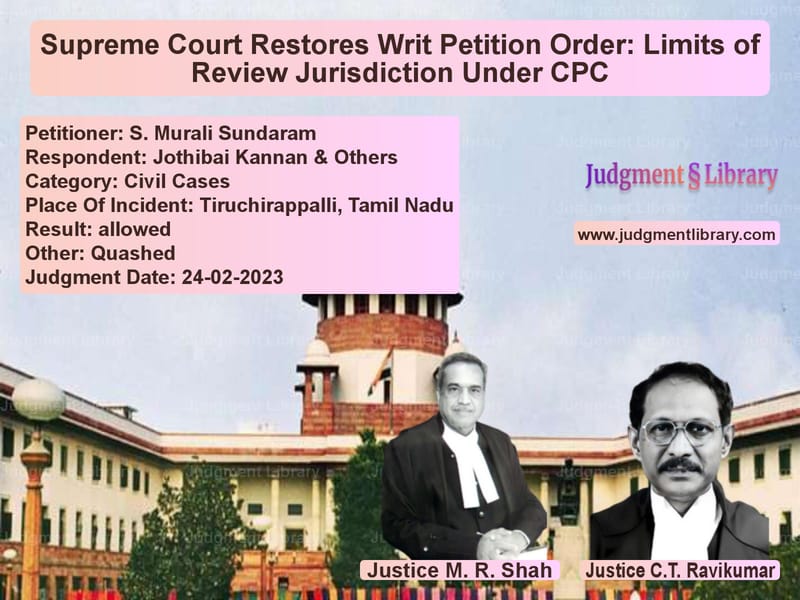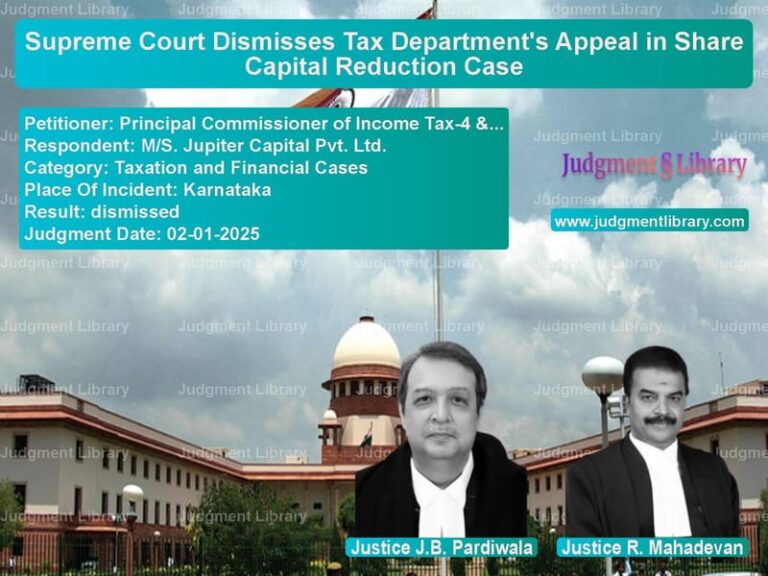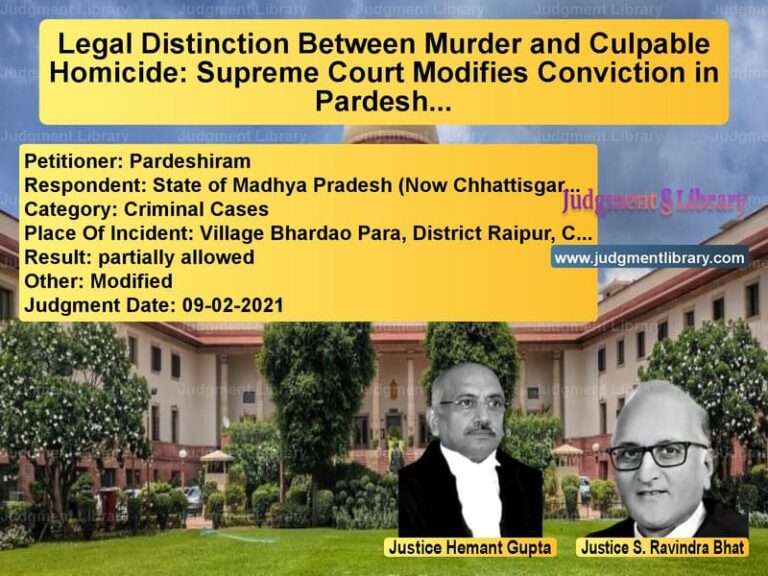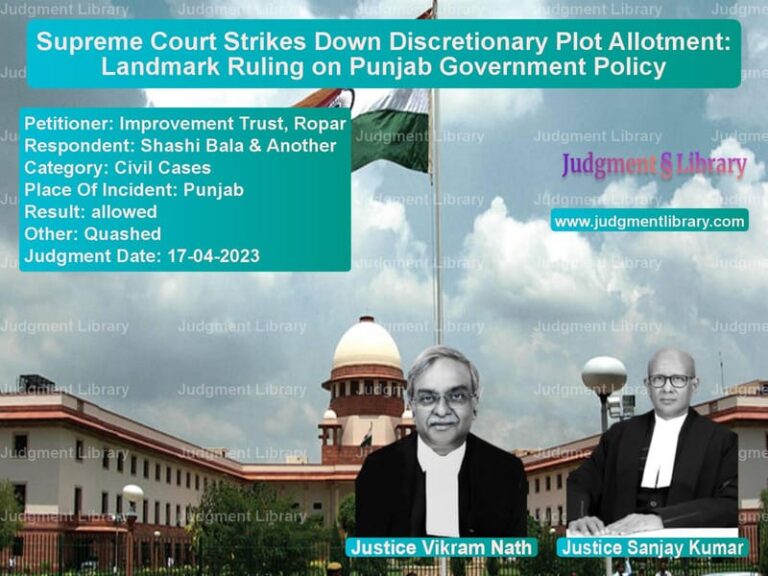Supreme Court Restores Writ Petition Order: Limits of Review Jurisdiction Under CPC
The case of S. Murali Sundaram vs. Jothibai Kannan & Others is a significant legal battle concerning the limits of review jurisdiction under the Code of Civil Procedure, 1908. The Supreme Court, in its judgment dated February 24, 2023, set aside the Madras High Court’s decision to allow a review petition and restored the original writ petition judgment. The ruling reinforces the principle that review jurisdiction cannot be exercised as an appellate power.
The dispute originated when the appellant, S. Murali Sundaram, challenged an order passed by the Tiruchirappalli City Municipal Corporation regarding a pathway in Indian Bank Colony, Simco Meter Road, Tiruchirappalli. The High Court initially ruled in favor of the appellant but later reversed its decision in a review petition filed by the respondents. The Supreme Court ultimately quashed the High Court’s review order, reinstating the original writ petition order.
Background of the Case
The controversy centered around the reliance on survey reports regarding the pathway in dispute. The appellant had filed Writ Petition (MD) No.8606 of 2010, challenging the municipal order. The High Court ruled in his favor on March 3, 2017. However, the respondents sought a review of this order through Review Application (MD) No.21 of 2017, arguing that the court had disregarded a critical survey report.
Additionally, two writ petitions (Writ Petition (MD) No.14847 of 2017 and Writ Petition (MD) No.16256 of 2017) and a contempt petition (Contempt Petition (MD) No.1109 of 2017) were filed concerning the same matter. The High Court, in its order dated June 29, 2021, allowed the review application, set aside the original writ petition order, and dismissed the connected petitions. The appellant then approached the Supreme Court.
Arguments by the Appellant
- The High Court had erred in exercising review jurisdiction as if it were an appellate body.
- The review was granted on grounds that had already been considered in the original writ petition.
- The High Court exceeded its jurisdiction by setting aside a reasoned judgment without any apparent error on the record.
- The review petition was used as a means to reargue the case, which is not permissible under Order 47 Rule 1 of the Code of Civil Procedure.
Arguments by the Respondents
- The High Court had rightfully exercised its review power as the original judgment was based on incorrect reports.
- The survey report presented by the respondents was disregarded without justification in the original writ petition.
- The original judgment led to an erroneous decision affecting public pathways.
- Since new facts had emerged, the High Court had the authority to correct its decision.
Supreme Court’s Observations and Judgment
The Supreme Court emphasized that the power of review is limited and cannot be used as an appellate mechanism. The Court stated:
“The power of review can be exercised for correction of a mistake but not to substitute a view. It is wholly unjustified and exhibits a tendency to rewrite a judgment by which the controversy has been finally decided.”
The Court cited key precedents, including:
- Perry Kansagra vs. Smriti Madan Kansagra (2019) 20 SCC 753: Rehearing of a matter is impermissible under review jurisdiction.
- Shanti Conductors (P) Ltd. vs. Assam SEB (2020) 2 SCC 677: A review cannot be used to correct a decision merely because it is perceived as erroneous.
The Supreme Court further elaborated:
“An error that requires detection through reasoning cannot be considered an error apparent on the face of the record. A review is not an appeal in disguise.”
Key Takeaways from the Judgment
- Review Jurisdiction is Limited: A review petition cannot be used to reargue a case or overturn a judgment unless there is an apparent error.
- Appellate Power vs. Review Power: The High Court exceeded its jurisdiction by treating the review as an appeal.
- Finality of Judicial Orders: Courts must ensure that review petitions are not misused to delay or overturn settled decisions.
Implications of the Judgment
This ruling sets a precedent for lower courts, ensuring that review petitions remain confined to correcting apparent errors rather than functioning as an alternate appeal process. It upholds judicial discipline and prevents misuse of the review mechanism.
Conclusion
The Supreme Court’s decision in this case reinforces the fundamental principles governing the review jurisdiction. By quashing the High Court’s review order and reinstating the original writ petition judgment, the Court has reaffirmed that review powers must be exercised within their defined limits. This ruling provides clarity for future cases involving review petitions and ensures that judicial decisions are not overturned arbitrarily.
Petitioner Name: S. Murali Sundaram.Respondent Name: Jothibai Kannan & Others.Judgment By: Justice M. R. Shah, Justice C.T. Ravikumar.Place Of Incident: Tiruchirappalli, Tamil Nadu.Judgment Date: 24-02-2023.
Don’t miss out on the full details! Download the complete judgment in PDF format below and gain valuable insights instantly!
Download Judgment: s.-murali-sundaram-vs-jothibai-kannan-&-ot-supreme-court-of-india-judgment-dated-24-02-2023.pdf
Directly Download Judgment: Directly download this Judgment
See all petitions in Property Disputes
See all petitions in Landlord-Tenant Disputes
See all petitions in Judgment by Mukeshkumar Rasikbhai Shah
See all petitions in Judgment by C.T. Ravikumar
See all petitions in allowed
See all petitions in Quashed
See all petitions in supreme court of India judgments February 2023
See all petitions in 2023 judgments
See all posts in Civil Cases Category
See all allowed petitions in Civil Cases Category
See all Dismissed petitions in Civil Cases Category
See all partially allowed petitions in Civil Cases Category







